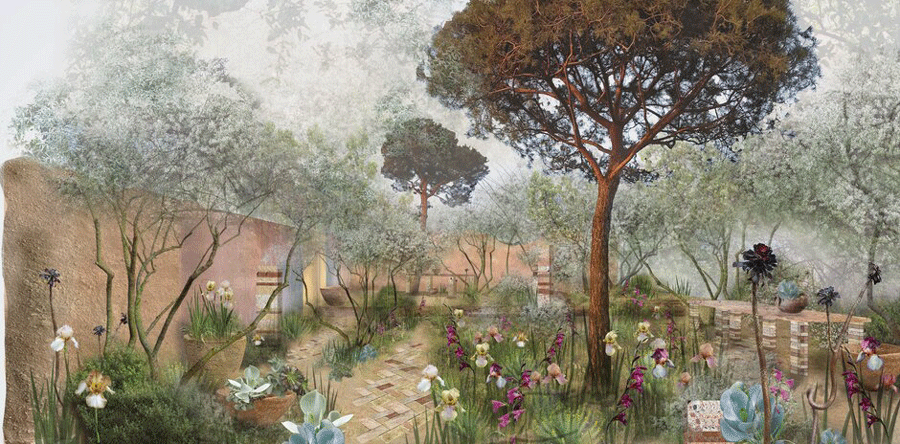Show garden inspired by Cedric Morris
 A garden inspired by the artist and plantsman Cedric Morris, his art and his naturalistic garden at Benton End, Hadleigh, Suffolk, will feature at the 2023 RHS Chelsea Flower Show.
A garden inspired by the artist and plantsman Cedric Morris, his art and his naturalistic garden at Benton End, Hadleigh, Suffolk, will feature at the 2023 RHS Chelsea Flower Show.
Designed by Sarah Price, ‘The Nurture Landscapes Garden‘ sponsored by Nurture Landscapes, will combine hard landscaping textures reminiscent of the house at Benton End, together with a planting palette of irises and other plants found in Morris’ work.
The distinctive palette of pink, blue and yellow, seen in two of Cedric Morris’ paintings will be reflected in the garden to offset the complex tones of Morris’ Benton Iris and his grey poppies.
The garden aims to communicate to a wider audience the importance of low-carbon gardening, and challenge the wasteful consumption often associated with garden design and construction by repurposing and reusing materials. All principles Nurture Landscapes strives to achieve through its services for customers.
Nurture Landscapes is based in Windlesham and was founded by Peter Fane. Peter’s brother, Mark Fane, owns Crocus and together they have agreed to build what they hope will be the most ‘sustainable garden to ever appear’ at the RHS Chelsea Flower Show.
One of Sarah’s most notable achievements was co-designing the 2012 Gardens at London’s Olympic Park and she was keen to collaborate with Nurture Landscapes because of their joint goal to help others nurture their gardens and green spaces, with sustainability always at the core.
Low carbon garden
Sarah Price said: “I’m excited to be back at Chelsea designing The Nurture Landscapes Garden. Together we’re focused on creating a low carbon garden, that celebrates the art and craft of garden making. It’s wonderful to have the support of Nurture Landscapes in the creation of this ambitious garden, knowing their commitment to long term sustainability and zero carbon by 2030.”
Sarah points out that the atmosphere and inspiration for the garden has been drawn from the paintings and plants of Cedric Morris (1889 – 1982) and his once renowned garden at Benton End, Hadleigh. The house and surrounding buildings of Benton End were constructed in the sixteenth-century using traditional crafts and techniques, from the naturally pigmented lime plaster, locally made bricks, to lathes for ceilings harvested from local chestnut copses.
Sarah adds: “This is the low-impact craft that we want to revisit and revive as part of our garden, but with a modern take on local materials.
“We will be making low carbon bricks for paving and pillars created from waste materials such as recycled crushed concrete and brick, and GGBS (a low embodied CO2 binder). The handmade bricks will be cast in wooden moulds, and then air cured instead of fired to reduce their embodied carbon.
“Stacked straw bales rendered with traditional lime mortar will create a textured backdrop. Old canvas backdrops sourced from scenery painters and repainted with plant-based paints made with linseed oil and flour will evoke the varied rich tones of Morris’ paintings.”
Bespoke planters will be created very simply by digging a hole in the ground and pouring in a waste-based casting mix. The planting within the garden will be entrancing, a cornucopia of bulbs, iris, annuals and perennials growing wild within a mature, semi-tended garden, dishevelled with nature encroaching at the edges.
Sarah uses five key plants in the garden: Benton Iris, Papaver rhoeas ‘Mother of Pearl’ Eremurus robustus, Aeonium arboretum and Elaegnus angustifolia.
Visit initiated inspiration for Chelsea garden
Sarah points out that nearly four years ago she was lucky enough to visit Benton End. It was April and demure fritillaries and Anemone pavonina were scattered among the long grace. The visit triggered memories of Sarah Cook’s mesmerising display of Benton Iris within the Pavilion at Chelsea in 2015. Together with Cedric Morris’ paintings, these two experiences helped to build up a picture of Benton End as a place of astonishing creativity; a place latent with inspiration for a Chelsea garden design. Knowing that the plants and materials of a Chelsea Garden could support the reimagining and reopening of Benton End gave the project added depth and longevity.
Sarah will rich coloured, textured, straw-cob walls as a backdrop to the wild-looking, semi-abandoned plantings, a nod to the original pigmented plaster and bricks that the house at Benton end is made from. The design explores a fresh approach to garden-making that places emphasis on craft to add aesthetic, environmental, and social value to a garden.
The garden aims to be as sustainable as possible and Sarah admits that the biggest challenge is about changing mindsets and, in turn, the approach and pattern of how we make gardens. Designing sustainably requires designing with consideration, care and tenacity. More time is required to be invested in research and development at the start of the design process. For example, auditing what local resources and skills are available, and how these may be best utilised. Assessing the carbon footprint of garden construction is still difficult – with data collection and methodologies in their infancies – not to mention complex, it’s therefore crucial to stay local in our sourcing and minimise transport wherever possible.
For Chelsea the sponsors are collaborating with Local Works Studio, innovative makers and thinkers based in Lewes, UK who focus on the creative and sustainable use of resources.
Show garden sponsor Peter Fane opened the doors of Nurture for business with just three members in 2008, with a focus on landscape maintenance and champion care for the environment. Today, the company employs 1,200 people nationwide. Contractor on the garden is Crocus, started by Mark Fane in 2000. Mark is a Chelsea stalwart, having built countless gardens in the past 20 years, scooping 30 gold medals along the way.
Sarah has designed several RHS Chelsea Gardens. In 2018 she won Gold for her design form M&G Investments and in 2012 Gold for her garden for The Telegraph.

